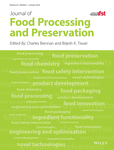Optimization of mechanochemical-assisted extraction and decoloration by resins of polysaccharides from petals of Crocus sativus L
Funding information: China Postdoctoral Science Foundation, Grant/Award Number: 2016M592016; Key Project of Science and Technology Department of Zhejiang Province, Grant/Award Number: 2015C02032
Abstract
Polysaccharide from petals of Crocus sativus (PPCs) was extracted by mechanochemical-assisted extraction (MCAE) method. The optimization of MCAE conditions was applied by the Response surface methodology. The optimal conditions were as follows: milling for 8.14 min, keeping in the ultrasonic bath at 40 °C with NaOH (0.2 wt %) for 15 min, and the solid/liquid ratio of 1/30 g/mL. Under the conditions, a yield of 28.97% was obtained, which was very consistent with the predicted yield of 29.20%. The decolorization effects of crude PPCs were studied. HPD-100 resin was selected as the decolorizing resin. The optimized dynamic adsorption condition was flow rate of 5.4 BV/hr, volume of 60 mL, temperature of 20 °C, 5 mg/mL PPCs extract. The ratios of decoloration, deproteinization, and polysaccharide recovery were 86.59, 86.60, and 80.54%, respectively. Then the antiproliferative activity of PPCs was assessed by 3H-TdR method on human lung carcinoma A549 cell and breast cancer MCF7 cell.
Practical applications
Mechanochemical-assisted extraction was applied to extract polysaccharides from petals of Crocus sativus, which was more time-efficient with fewer solvents than traditional extraction methods. In addition, polysaccharides from petals of Crocus sativus demonstrated a promising antiproliferative property, which means that the byproducts of saffron might be a potential natural drug or health food for human lung carcinoma therapeutics.




